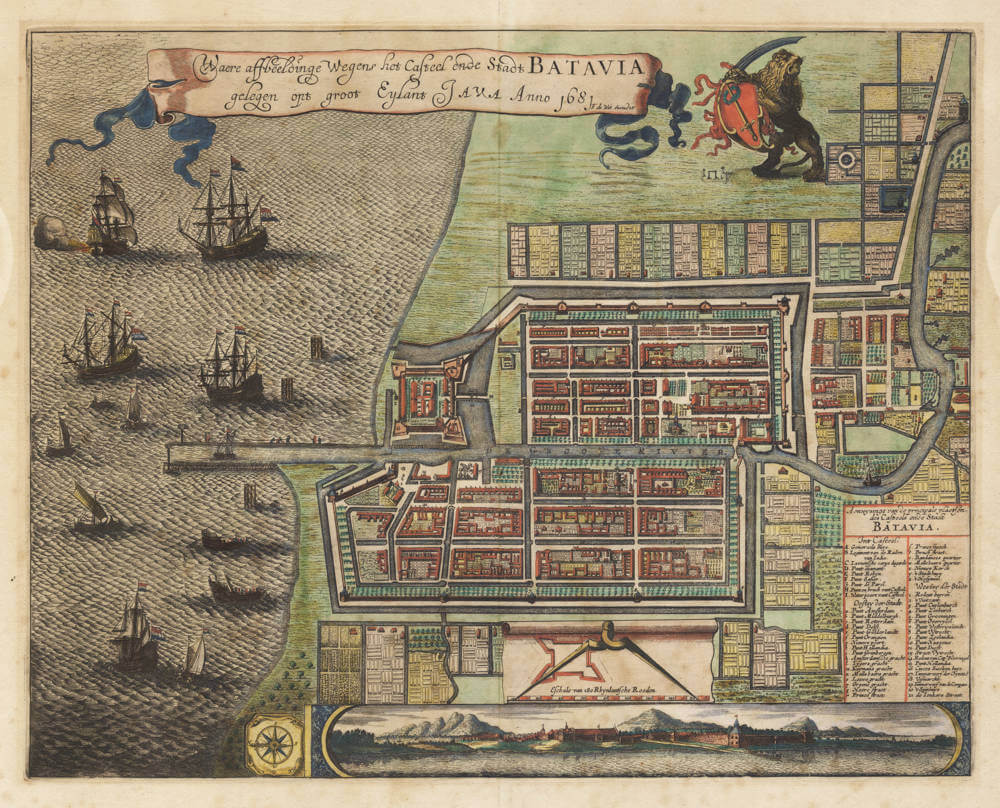Leen Helmink Antique Maps & Atlases
www.helmink.com
Frederick de Wit
Waere affbeeldinge Wegens het ...
Certificate of Authentication
This is to certify that the item illustrated and described below is a genuine antique
map, print or book that was first produced and published in 1681, today 343 years ago.
March 29, 2024
Dr Leendert Helmink, Ph.D.
Cartographer(s)
Frederick de Wit
First Published
Amsterdam, 1681
This edition
1681 first edsition
Size
40.2 x 50.8 cms
Technique
Copper engraving
Stock number
19409
Condition
very good


Description
Waere affbeeldinge Wegens het Casteel ende Stadt BATAVIA gelegen opt groot Eylant JAVA Anno 1681 F. de Wit Excudit
True depiction of the Castle and the City of BATAVIA, situated on the grand Island Java Anno 1681 published by F. de Wit
Frederick de Wit's rare and sought-after city plan of Batavia (Djakarta, Jakarta), headquarters of the East Indies for the Dutch VOC from 1628 onwards and for centuries the pearl of the Indies.
The detailed plan of the walled city of Batavia with the roadstead, the Castle and the city as seen from the west (the "evening side"). North is at the left of the map. The roadstead is filled with VOC East Indiamen at anchor.
Along the bottom is a decorative panorama of the city as seen from the roadstead.
The coat of arms of the city is in the upper right, held by the Dutch lion. At his feet we see the gallow fields east of the city.
An extensive numbered index on the right lists the principal buildings and places. Outside the walled city are rice and sugar fields, cattle stables, fortresses and bastions.
The plan covers the area of the old city with canals and Dutch architecture and canal houses, today's 'Sunda Kelapa' around the old harbour and fish market and the East India Company warehouses. A stunning piece of Indonesian and Dutch history.
The map is based on a larger separately issued broadsheet map of ca 1650 by Clement de Jonghe.
Condition
First edition, first state (much rarer than the later reissue of ca 1721 by Covens and Mortier). Thick paper, wide margins. Paper mellow yet very authentic look and feel. Vibrant original colour. A desirable collector copy of the best map of the city.
Frederick de Wit (1630-1706)
Frederick de Wit was one of the most prominent and successful map engravers and publishers in Amsterdam in the period following the decline of the Blaeu and Jansson establishments, from which he acquired many copper plates when they were dispersed at auction.
His output covered most aspects of map making: sea charts, world atlases, an atlas of the Netherlands, ‘town books' covering plans of towns and cities in the Netherlands and Europe, and wall maps. His work, notable for the beauty of the engraving and colouring, was very popular and editions were issued many years after his death by Pieter Mortier and Covens and Mortier.
(Moreland and Bannister)